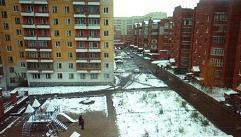
"Siberia 2007" story # 34
WINTER HAS COME
Tomsk, Russia
October 11, 2007
On September 28th, due to irreconciliable differences (that had caused me, and probably the unversity, a lot of stress), I and the university where I'd been working parted ways. They paid me for the month. So, now I had no jobs. But, I walked down the street - full, healthy yellow leaves fell in avalanching numbers, covering the dark concrete on which I walked - to another Tomsk university, and they eagerly hired me.
On September 29th, the weather was sunny; the sky was blue. The air was still colder than cool; but, it was nice to be outside. Some of my former university's students and I met for Saturday English Club. We walked to a calm park, hidden away from Tomsk's main roads. The young trees around us were mostly bare. We sat in the good weather and talked.
On September 30th, I made the long marshutka ride to the center again. Some of yesterday's same students had invited me to a Russian Top Division soccer match. These students, like many in their university which teaches teaching, were female with mild personalities. The day was drizzly, a day for wet noses, a day in which the soccer fans dressed for the cold, and dressed in black, because the seats were dirty from the rain.
On October 1st, I wrote. Muslim's apartment in which I live was comfortably toasty.
On October 2nd, it was cold and wet. It's very rare for an evening to be as cold and at the same time as wet as this evening was. The outside weather was completely disagreeable. When does the first snow come to Siberia, you might ask? On this night, in 2007, the "porosho" (first snow) came to Tomsk.
We awoke, on October 3rd, to two inches of snow covering the grassy parts of Tomsk. I smiled. Bright white.
The air was white and snowy and fresh and cold and lively. On a quiet, winding road, populated by bear-brown wooden log-houses with blue and green window shutters, I walked near the snow and posted flyers advertising my search for a room.
I walked Tomsk's main street, with its beautiful university campuses. Purple, rounded buildings stood upon columns; romantic benches encircled a fresh courtyard, surrounded by Tomsk State University's cute forest. Walking past this forest, I stepped on a butter-colored carpet of leaves. The snow beside me on the ground, and the tiny flakes falling, beside rows of naked trees, often lifted my spirits.
But ...
(I hate "But ...'s" in times like these.)
without it getting any warmer, really, the snow melted within a few days. And,
after falling in mutual love with my new university's students, after partying for twelve hours one night and even playing Twister with one class of students, I lost my job again. (It had nothing to do with my performance, and everything to do with unfriendly government rules. The work I did will probably go unpaid.) Oh, woe are we.
One of those students, Sergei, was, and is, a pacific anarchist. A class of mostly boys with nicknames was very funny. One blond girl is extraordinarily gentle yet strong, and already a good friend.
I still live in the far-away and charm-less "suburbs". My Tomsk stay, thus far, has yielded many disappointments. I have little energy to go on. But ... I'm still going on.
My time with classic Russian literature, I'm happy to say,
recently yielded a golden gem. Anton Pavlovich Chexov's short story, "The Sixth Ward," is a philosophic thriller! Here are some translated quotes from it:
"... suffering leads a man to perfection ..."
"In Dostoyevsky's or Voltaire's writings, someone said that if there wasn't a God, people would've thought Him up themselves."
The doctor tries to ease his patient's suffering, with this advice:
"Pain is merely the imagined incarnation of pain: make strong your will, in order to alter this unreal percerption, extinguish it, stop complaining, and the pain leaves."
But, the patient counters with:
"The lower the organism, the less receptive he is and the more weakly he responds to irritation, but the higher he is, the more perceptively and energetically he responds to reality." The patient loves and wants to feel life.
Admittedly, I don't understand everything I read. But, I want to read more philosophical and psychological writings. Tonight, I think I'll start Dostoyevsky's "The Idiot." It's gonna be tough!

peace and success,
Modern Oddyseus